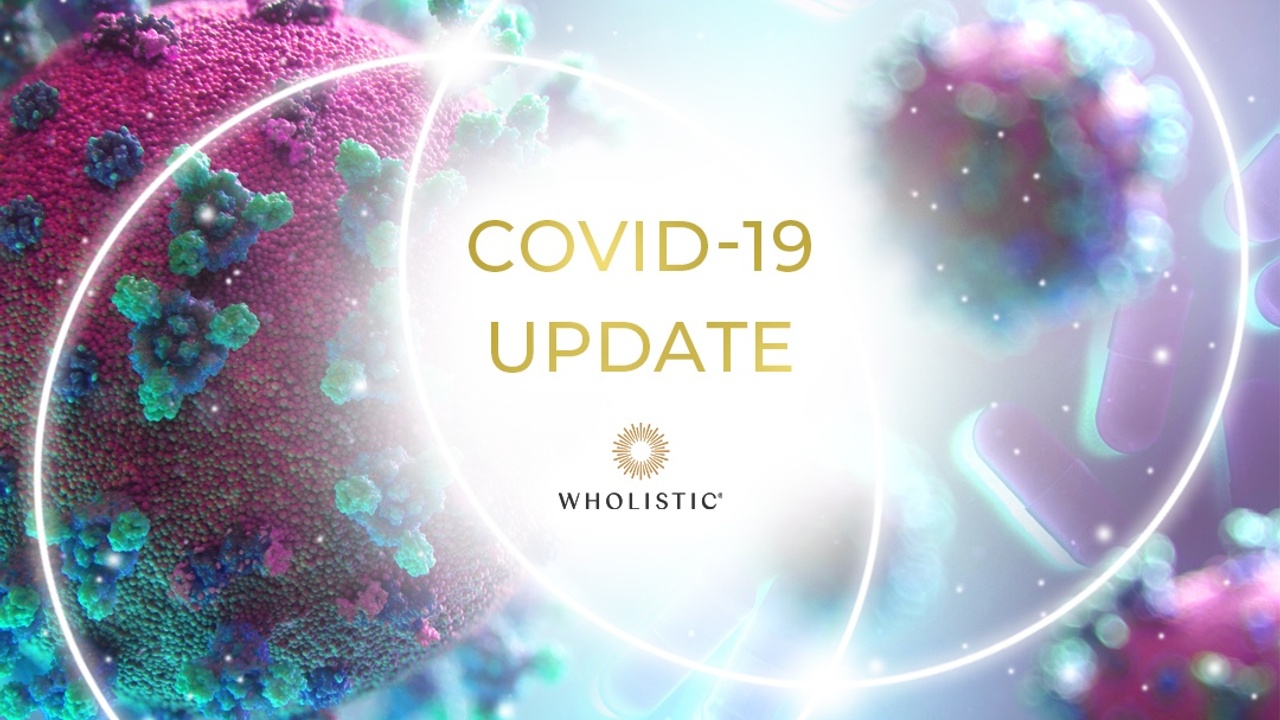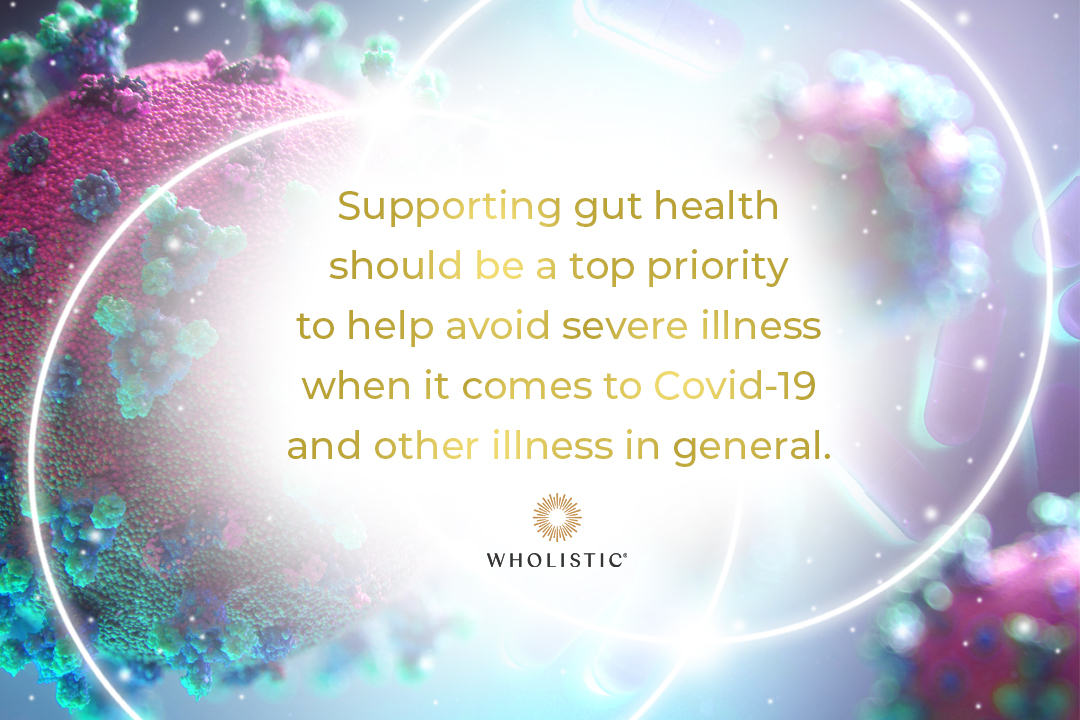Covid-19 Update

I recently attended a seminar held by Dr. Pamela Smith, author of Max Your Immunity, all about Covid-19 and ways you can support your immune system to fight off illness. I wanted to share some of the valuable information with you, because it is information that can actually help you prevent or treat inflammation in the body from other causes as well.
More research is needed, but a solid foundation of research on this topic is being built. Keep in mind that the best approach is an individualized approach to treatment, but I am sharing protocols and advice that should be helpful in a general way for many people.
In this blog, I will be discussing the importance of gut health when it comes to preventing and treating inflammatory conditions like Covid-19. We will address stress and its impact on the immune system and gut health, how Covid-19 affects the balance of the gut microbiome, and how probiotics and prebiotics can reduce inflammation in the body and mitigate Covid-19 symptoms.
Don’t miss a special announcement at the end about some holiday savings on my website!
Stress Impacts Immune System And Gut Health
It’s undeniable that our society has a chronic stress epidemic. There is a study that suggests 75% to 90% of visits to primary care doctors are stress related. (1) As we age, our response to stress changes. The body can no longer work so hard to keep everything running smoothly when it is faced with physical or psychological stressors. Our ability to terminate cortisol production when stress arises is diminished. Chronic inflammation from stress can lead to a “resistant” immune system and even autoimmune disease.
One of the most important things to understand about the immune system is that it requires energy to function. We can’t think of it as an automatic shield against illness. One of the reasons stress can compromise the immune system so much is that stress uses a lot of energy. So chronic stress produces systemic changes in the immune system due to accumulation of stress hormones, increased production of inflammatory cytokines, and competing energy usage. Your immune system is fighting an uphill battle once you come into contact with a virus like Covid-19.
The gut microbiota helps regulate immune system balance, but when stress is an issue - the gut microbiome is compromised. The result is an imbalance of good and bad bacteria because the good bacteria is greatly reduced. It’s critical to support gut health because it is a protective barrier for the intestinal tract and affects all systems of the body. If there are pathogenic bacteria present in the gut microbiome or not as many good bacteria, a person is more at risk for disease. (2)
The takeaway here is that reducing stress in your life should be the first step when it comes to supporting your immune system. This could mean taking a look at your schedule and trimming back your obligations. You may need to cut off toxic relationships. If you are under a lot of physical stress it may be time to prioritize rest. There are a lot of small daily stressors that can add up to chronic stress, so examine your life and see what can change - your health depends on it!
How Covid-19 Affects Gut Microbiome
What experts are discovering is that anyone can develop severe disease when infected with COVID-19. However, having a strong, supported immune system going into any illness is going to help prevent the most severe cases requiring hospitalization.
I wanted to highlight some new findings about how Covid-19 affects the gut because it is becoming clear that supporting gut health should also be a top priority to help avoid severe illness when it comes to Covid-19 and other illness in general.

While fever, cough, and shortness of breath are the main Covid-19 symptoms, diarrhea is a symptom that has been reported with some pathways of the infection as well. GI symptoms such as diarrhea, nausea and/or vomiting, and abdominal pain are seen in up to 1 in 5 patients with COVID-19 infection based on the results of a meta-analysis study by Tariq et al. (3)
Covid-19 causes immense stress and inflammation in the body which compromises the gut lining, affecting proper absorption of nutrients and medications that could help combat the virus. In some cases, the GI tract becomes severely damaged. A preliminary study highlighted that some patients with COVID-19 had decreased bacteria in their gut such as Lactobacillus and Bifidobacterium. (4)
Covid-19 seems to primarily cause lung issues, but the lungs and gut are connected through the gut-lung axis. Respiratory mucosa and gut microbiota actually work together in a healthy immune response to Covid-19, so it is well worth looking into prioritizing gut health to reduce chances of contracting Covid-19 and to lessen the negative effects if the illness is contracted.
Probiotics And Prebiotics Reduce Inflammation And Covid-19 Symptoms
Researchers are suggesting using probiotics to reduce inflammatory cytokines and gastrointestinal symptoms for those with Covid-19. More importantly, the use of probiotics prior to exposure can help prevent viral respiratory infections. In a recent study, a probiotic formulation administered to patients with COVID-19 helped mitigate gastrointestinal symptoms and other symptoms, such as fever, cough, dyspnea, headache, myalgia, and a decreased risk of evolving respiratory failure compared with untreated patients in the trial. (5)
The key is supporting the barrier function of the gut with probiotics and prebiotics. Supporting the colonization of Lactobacilli and Bifidobacteria bacteria in the gut can help protect from many different types of diseases including cancer. (6)
When you are looking to supplement with a probiotic, a spore-based, broad-spectrum probiotic is the ideal choice. MegaSporeBiotic clinically was shown to improve leaky gut by 60% in 30 days. (7) However, you can include probiotics in your daily diet with probiotic-rich food and drinks. Here are some great examples of what you can include...
Probiotic Rich Foods and Drinks:
- Kombucha
- Miso
- Natto
- Kimchee
- Sauerkraut
- Tempeh
- Raw pickles
- Ginger
- Olives
- Fermented vegetables
- Raw vinegars
- Essene bread (Ezekiel bread)
After about a month on probiotics, you can start focusing on prebiotics too. Prebiotics support the growth and effectiveness of probiotics. Think of them as food for the beneficial bacteria in your gut. Prebiotic-rich diets have also been shown to lower inflammation in the body and increase the production of beneficial short-chain fatty acids. Here are some prebiotics you can include in your diet from food...
Prebiotic Rich Foods:
- Onions
- Chicory
- Garlic
- Leeks
- Jerusalem artichokes
- Burdock root
- Asparagus
- Peas
- Legumes
- Eggplant
- Honey
- Green tea
A Gift From My Heart For Your Health
I have a special gift from my heart to boost your health... For a limited time, all of my digital products are 25% off! I offer an abundance of online courses, meditations, and books for you to explore. You can learn even more in-depth information about gut health in my online course: Wholistic Wisdom. You can find so many other supportive tools on my website that will guide you to body, mind, and soul balance in all areas of life.
Simply use the coupon code CREATIVITY25 to receive your discount (code expires December 3, 2021, cannot be combined with any other current sales, and excludes all physical products, one-on-one services, and payment plans).
Shop Now: Online Courses Meditations Books
References
- Head, K., et al., “Nutrients and botanicals for treatment of stress: adrenal fatigue, neurotransmitter imbalance, anxiety, and restless sleep.” Altern Med Rev 2009; 14(2):114-40.
- Konturek, P., et al., “Stress and the gut: pathophysiology, clinical consequences, diagnostic approach and treatment options,” Jour Physiol Pharmacol 2011; 62(6):591-99.
- Tariq, R., et al., “Prevalence and mortality of COVID-19 patients with gastrointestinal symptoms: A systematic review and meta-analysis,” Mayo Clin Proc 2020; 95(8):1632-48.
- Xu, K., et al., “Management of COVID-19: The Zhejiang experience,” Zhejiang Da Xue Xue Bao Yi Xue Ban 2020; 49:147–57.
- d’ Ettorre, G., et al., “Challenges in the management of SARS-COV2 infection: The role of oral bacteriotherapy as complementary therapeutic strategy to avoid the progression of COVID-19,” Front Med (Lausanne) 2020; 7:389.
- Bezirtzoglou, E., et al., “Immunology and probiotic impact of the newborn and young children intestinal microflora,” Anaerobe 2011; 17(6):369-74.
- McFarlin, B., et al., “Oral spore-based probiotic supplementation was associated with reduced incidence of post-prandial dietary endotoxin, triglycerides, and disease risk biomarkers,” World Jour Gastroenterology Pathophysiology 2017; 8(3):117-26.
Seminar Presentation Reference: • Smith, P., Max Your Immunity. Garden City Park, NY: Square One Publishers, 2021.
Discover Three Powerful Ways to Bring Health & Vitality Into Your Everyday Life in This FREE Masterclass by Worldwide Master Practitioner In Wholistic Healing, Elena Bensonoff.
Sign Up for the Masterclass below:






